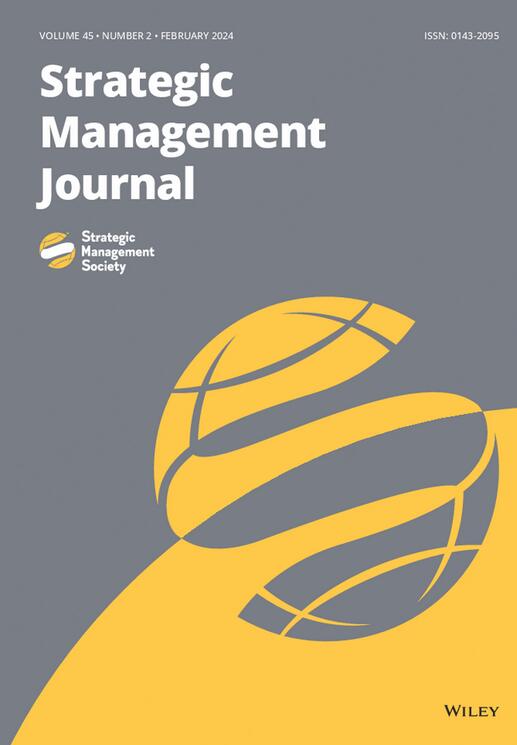Who captures the state? Evidence from irregular awards in a public innovation grant program
IF 7.2
1区 管理学
Q1 BUSINESS
引用次数: 0
Abstract
Research summaryThis study utilizes the administrative data of an innovation grant program in a major emerging economy to study which firms are best positioned to capture the state and access resources beyond what their rule‐complying merits command. We trace the grant allocation process and directly observe occurrences of rule‐violating funding. We show that firms vary in capability to secure irregular awards, depending on factors such as geographic proximity and the social and bureaucratic setting within which entrepreneurs and officials interact. Furthermore, by comparing the actual allocation of irregular awards with the counterfactual scenario in which recipients were evaluated solely based on grant rules, we conclude that crony capitalism, rather than bureaucratic heroism, is the primary driver of irregular awards.Managerial summaryGovernments often use innovation grant programs to promote firm innovation, but these programs sometimes fail to achieve their objectives due to grant officials violating policy rules to provide resources to undeserving firms. We study a public funding program in a major emerging economy to analyze the bureaucratic structure and the social dynamics within which entrepreneurs and bureaucrats interact to identify the sources of state‐resource misallocation. We find that geographic distance, intragovernmental checks and balances, and the lack of direct social intermediary connecting entrepreneurs with bureaucrats help reduce the likelihood of collusion for state‐resource misallocation. Our results generate insights to help guide the (re)design of public funding programs, particularly in countries with low levels of transparency and public accountability.谁抓住了国家?公共创新补助金计划不定期奖励的证据
研究摘要 本研究利用一个主要新兴经济体的创新拨款项目的行政数据,研究哪些企业最有能力抓住国家的政策,获得超出其遵守规则的优点所能获得的资源。我们追踪了拨款过程,并直接观察了违反规则的拨款情况。我们发现,企业获得违规拨款的能力各不相同,这取决于地理位置的远近以及企业家与官员互动的社会和官僚环境等因素。此外,通过比较违规奖励的实际分配情况与仅根据拨款规则评估受奖者的反事实情况,我们得出结论,裙带资本主义而非官僚英雄主义是违规奖励的主要驱动力。管理总结政府经常使用创新拨款项目来促进企业创新,但由于拨款官员违反政策规则向不值得资助的企业提供资源,这些项目有时无法实现其目标。我们研究了一个主要新兴经济体的公共资助项目,分析了企业家和官僚互动的官僚结构和社会动态,从而找出国家资源分配不当的根源。我们发现,地理上的距离、政府内部的制衡以及企业家与官僚之间缺乏直接的社会中介,有助于降低国家资源错配的合谋可能性。我们的研究结果有助于指导公共资金项目的(重新)设计,尤其是在透明度和公共责任水平较低的国家。
本文章由计算机程序翻译,如有差异,请以英文原文为准。
求助全文
约1分钟内获得全文
求助全文
来源期刊

Strategic Management Journal
Multiple-
CiteScore
13.70
自引率
8.40%
发文量
109
期刊介绍:
At the Strategic Management Journal, we are committed to publishing top-tier research that addresses key questions in the field of strategic management and captivates scholars in this area. Our publication welcomes manuscripts covering a wide range of topics, perspectives, and research methodologies. As a result, our editorial decisions truly embrace the diversity inherent in the field.
 求助内容:
求助内容: 应助结果提醒方式:
应助结果提醒方式:


